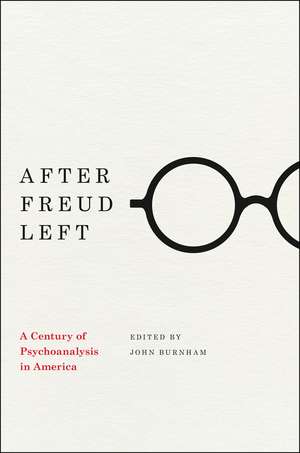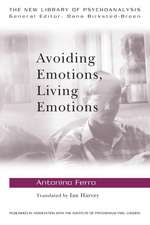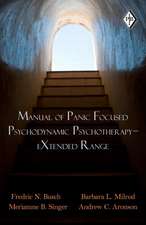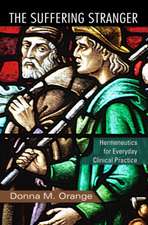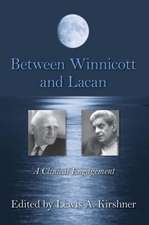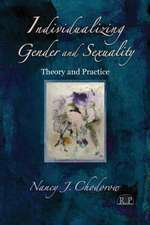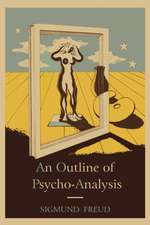After Freud Left: A Century of Psychoanalysis in America
Editat de John Burnhamen Limba Engleză Paperback – 15 dec 2014
There has been a flood of recent scholarship on Freud’s life and on the European and world history of psychoanalysis, but historians have produced relatively little on the proliferation of psychoanalytic thinking in the United States, where Freud’s work had monumental intellectual and social impact. The essays in After Freud Left provide readers with insights and perspectives to help them understand the uniqueness of Americans’ psychoanalytic thinking, as well as the forms in which the legacy of Freud remains active in the United States in the twenty-first century. After Freud Left will be essential reading for anyone interested in twentieth-century American history, general intellectual and cultural history, and psychology and psychiatry.
Preț: 229.39 lei
Nou
Puncte Express: 344
Preț estimativ în valută:
43.89€ • 47.83$ • 36.99£
43.89€ • 47.83$ • 36.99£
Carte tipărită la comandă
Livrare economică 23 aprilie-07 mai
Preluare comenzi: 021 569.72.76
Specificații
ISBN-13: 9780226211862
ISBN-10: 022621186X
Pagini: 280
Ilustrații: 12 halftones, 1 table
Dimensiuni: 152 x 229 x 23 mm
Greutate: 0.36 kg
Editura: University of Chicago Press
Colecția University of Chicago Press
ISBN-10: 022621186X
Pagini: 280
Ilustrații: 12 halftones, 1 table
Dimensiuni: 152 x 229 x 23 mm
Greutate: 0.36 kg
Editura: University of Chicago Press
Colecția University of Chicago Press
Notă biografică
John Burnham is research professor in the Department of History at Ohio State University. His most recent book is Accident Prone: A History of Technology, Psychology, and Misfits of the Machine Age, also published by the University of Chicago Press.
Cuprins
Introduction
PART I: 1909 TO THE 1940S: FREUD AND THE PSYCHOANALYTIC MOVEMENT CROSS THE ATLANTIC
Introduction to Part I: Transnationalizing
SONU SHAMDASANI
ONE / Psychotherapy, 1909: Notes on a Vintage
RICHARD SKUES
TWO / Clark Revisited: Reappraising Freud in America
ERNST FALZEDER
THREE / “A Fat Wad of Dirty Pieces of Paper”: Freud on America, Freud in America, Freud and America
GEORGE MAKARI
FOUR / Mitteleuropa on the Hudson: On the Struggle for American Psychoanalysis after the Anschluß
HALE USAK-SAHIN
FIVE / Another Dimension of the Émigré Experience: From Central Europe to the United States Via Turkey
Introduction to Part I: Transnationalizing
SONU SHAMDASANI
ONE / Psychotherapy, 1909: Notes on a Vintage
RICHARD SKUES
TWO / Clark Revisited: Reappraising Freud in America
ERNST FALZEDER
THREE / “A Fat Wad of Dirty Pieces of Paper”: Freud on America, Freud in America, Freud and America
GEORGE MAKARI
FOUR / Mitteleuropa on the Hudson: On the Struggle for American Psychoanalysis after the Anschluß
HALE USAK-SAHIN
FIVE / Another Dimension of the Émigré Experience: From Central Europe to the United States Via Turkey
Part II: After World War II: The Fate of Freud’s Legacy in American Culture
Introduction to Part II: A Shift in Perspective
DOROTHY ROSS
SIX / Freud and the Vicissitudes of Modernism in America, 1940–1980
LOUIS MENAND
SEVEN / Freud, Anxiety, and the Cold War
ELIZABETH LUNBECK
EIGHT / Heinz Kohut’s Americanization of Freud
JEAN-CHRISTOPHE AGNEW
NINE / The Walking Man and the Talking Cure
Conclusion
Chronological Guide to Events
List of Contributors
Acknowledgments
Index
Recenzii
“The book, which includes essays by historians of medicine and of culture, among them Elizabeth Lunbeck, George Makari, Louis Menand, and Dorothy Ross, tells a tale of how psychoanalysis resonated with some of the major thinkers of the time—including Lionel Trilling, Herbert Marcuse, and Norman O. Brown to name but a few. . . . In assembling an illustrious group of historians to write about this topic, Dr. Burnham has done a terrific service to a profession that might well want to reflect on its origins.”
“[A] fascinating volume.”
“In this outstanding collection of essays, Burnham offers a rich, compelling illumination of how psychoanalysis, as the discipline that Freud founded and many refugees carried to America, fared given the changing cultural and historical landscape in the US since 1909, the year Freud delivered his famous Clark University lectures. . . . This volume will be of great value to historians of American culture, psychoanalysis, and intellectual history. Highly recommended.”
“After Freud Left makes a much needed intervention into the historical record, revealing the eclectic and incongruous ways in which Freud’s ideas migrated stateside.”
“[T]his book contains many fascinating historical facts that help broaden the understanding of the development and decline of psychoanalysis in America.”
“[E]xcellent. . . . The book is strongly recommended to anyone who is interested in the history of psychoanalysis, but also to people who want to know more about this important chapter in the intellectual history of the twentieth century.”
“An engaging collection of essays.”
“With a superbly nuanced and reflective introduction by this collection’s editor, John Burnham—the doyen of the history of American psychoanalysis—the papers explore, with remarkable erudition and display of previously unexplored sources, the arrival of psychoanalysis in the United States, symbolized by Freud’s one brief visit, to Clark University, in 1909, and the long arc of its rise and decline across the hundred years from 1909–2009. Emigration, transformation, distortion all played their part in the production of American psychoanalysis, which was infused to a remarkable extent in midcentury American life and now appears to be evaporating as quickly as it arrived. Does it leave traces? The historians and critics whose fine papers are collected in After Freud Left give nuanced and original answers.”
“All too often the history of psychoanalysis has been written from polemical standpoints, leaving us to lurch between uncritical hagiography and categorical repudiation. After Freud Left avoids these pitfalls, locating the rise and fall of psychoanalysis in the United States within broader social, political, cultural, and international developments. The result is a lively and intriguing set of essays, which offer refreshingly new, often surprising, insights into the history of this important intellectual movement.”
